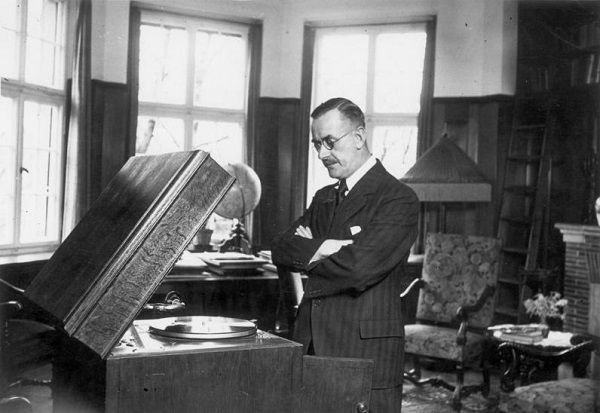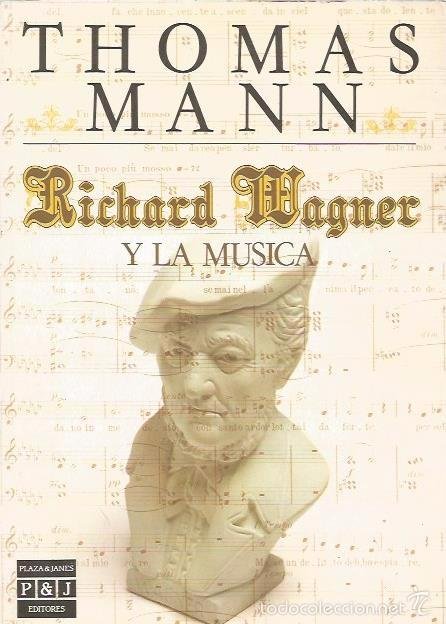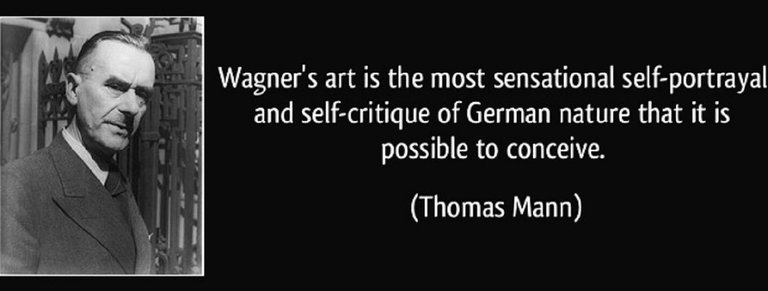Personality and creative work by Richard Wagner has involved Thomas Mann throughout his life. What's more, along with Schopenhauer and Nietzsche Wagner, as a typical German genius, he became one of the great cultural experiences of the writer, which formed and inspired his own artistic expression. Even in his first novel "Buddenbrooks", the young Thomas Mann opposes the image of the Bayreuth master of a healthy, but unremitting bourgeois solidity. From Wagner he also perceives the compositional leitmotif technique, which allows him to thicken the action and to paint his characters with only a few characteristic features. Still under Wagner's influence, the writer builds his works as "musical scores," in which the development of action follows the principle of "endless melody". To the Wagner's personality, Thomas Mann, who lived from 1875 to 1955, devotes many pages, but his detailed reflections in the essay "Passion and Majesty of Richard Wagner", published in 1933, are endorsed. This text has its cultural and political history. When thirty-third January in Germany came to power Adolf Hitler, Thomas Mann worked on a lecture on the fiftieth anniversary of the death of his favorite composer. He delivered his lecture ten days later at the University of Munich, and then with hand luggage, as in any other lecture trips until then, he went to Amsterdam, Brussels and Paris to take the lecture there. He does not think about emigration at all, and the idea of long-lasting or even life-long exile far from his homeland seems unbearable. But the events take another turn. When the full text of the essay comes out in the April issue of the Neue Rüssau magazine, "The protest of Richard Wagner's City of Munich," signed by prominent intellectuals, including composers Hans Pfiffner and Richard Strauss, appears in the press.

In fact, in the essay "Protest", Thomas Mann has been extremely inscrutable about the contradictions of the German spirit and German art, reaching unusual peaks in the nineteenth century. And this century is marked, in his words, with greatness, and with the gloomy, suffering, skeptical and at the same time known the bitter taste of the truth, fanatically believing in the truth of grandeur, skilled in the fleeting intoxication of transient beauty to find a short-lived, unbounded by faith happiness. What raises Wagner's work to such a spiritual height as compared to the level of the whole musical drama before him? Thomas Mann's answer that the combination of two forces determines this upsurge, two forces, two ingenious gifts, which should be regarded as hostile to each other, but whose contradictory essence is today, again and again, is prominently on the front. These two forces are PSYCHOLOGY and MYTH. Some want to deny their compatibility, their psychology seems too rational, so they find it hard not to perceive it as an insurmountable obstacle on the way to the mythic side, they think it is against myth and music, athough it is this complex of psychology , myth and music stands before us as an organic reality embodied in two great figures - in Nietzsche and Wagner.

Wagner, as a psychologist, could write a whole book about the psychological art of both the composer and the poet, as far as these qualities can be distinguished. The memory as a motif, sometimes used in the old opera, is gradually being developed into an in-depth virtuoso system that, with a previously unknown power, makes the music an instrument for psychological allusions, introspections, references. How much Wagner's poetic feeling from the outset goes beyond the usual libretto, and not so linguistically or psychologically! The cursed Dutchman loves Senta at first glance, but he tells himself that his love is not in fact directed at her, but in his own salvation, his redemption. She is, at the same time, an embodiment of his ability to save, so he can not and does not want to make a difference between his longing for spiritual salvation and his longing for Senta. Because his hope has accepted her image, and he can no longer want this image to be another, that is, he loves this girl as her salvation. What a complex duality, what penetration into the hard-to-reach depths of a feeling! This is an analysis - and this word is in an even more modern, even more daring sense when we look at the spring birth and development of the love of young Siegfried, animated by Wagner both with speech and the means of a deeply expressive music. Here, there is a premonition glimmering through the depths of the subconscious complex of affinity to the mother, sexual attraction, and FEAR - I mean that fabulous fear Siegfried wants to know - a complex showing the remarkable, intuitive unity between psychologist Wagner and another a typical nineteenth-century son, psychoanalytic Sigmund Freud. In how the thought of the mother in the dreams of Siegfried beneath the lime is overflowing with eroticism, how in the scene where Mime is trying to explain to his alumni what fear is and the orchestra urgently sounds in a grim distorted way the motif of the sleeping in the fire Brunhilda , we already see Freud, we see analysis and nothing else. Let us recall that Freud, whose precursor on a large scale in the radical exploration of the soul and its depths is Nietzsche, has an interest in mythical, inherently human and pre-cultural, is most closely related to his psychological research.

Wagner as a proponent of the myth, as the discoverer of the opera myth, as the liberator of the opera by myth - this is the second feature. Indeed, he does not have the same soul-to-soul relationship with this world of images and ideas, a skill to enchant the myth and to inspire him a new life: finding the way from the historical opera to the myth he finds himself; when we listen to his music, we are ready to believe that it is created only to serve myth, and that she could never have another task. Whether the myth appears as a messenger sent from pure spheres to help innocence and forced - alas! - because of the unsustainability of faith to return to where he came from or as a wise, chanting tale of the beginning and the end of the world as a cosmogonic, fabulous philosophy - always the spirit, the essence, the sound of the myth are achieved with certainty and based on inner intuition of kinship, and his tongue has such innate naturalness as has never been the case in art at all. This is the language of "there was one time" in its ambiguity as "what it was," and "what it will be." And the mythological density of the mood, for example, in the Nordic scene at the beginning of the "Götterdämmerung" where the three daughters of Erdus are attributed to some priestly summons of world fates, or to the appearance of Erdus herself in "Das Rheingold " and "Siegfried" , is unsurpassed. The super-powerful accents of the music accompanying the procession with Siegfried's body no longer relate to the forest boy who started to know fear, they reveal to our feelings what is actually going on there, behind the falling fog of the mist: the hero of the sun lies on the litter, shrouded by thick darkness; and the clarifying word comes to reinforce the feeling: "Wild boar rage" is said there, and Gunter, pointing to Hagen, says, this is a bloody curse, a torn knight noble.The perspective penetrates the primal, earliest image of humanity. Tamus and Adonis, fished by a wild boar, Osiris and Dionysus, torn and retreating in the face of the Crucified, whose breasts have to be wounded by a Roman copy so that he can be recognized, everything that has been and always is, the whole world the beauty that has been sacrificed, destroyed by raging fury - there is nothing that is not covered by this mythical vision, and let's not say that the creator of Siegfried has changed to Parsifal.
At the end of his essay, Thomas Mann said a few words about Wagner as a thinker, about his attitude to the past and the future. For here too, in its character, there is a duality and intertwining apparent contradictions corresponding to the contrast between Germanism and Europeanism. In Wagner's face, the writer discovers reactionary traits - traits that testify to backwardness and a dark cult of the past. In this sense, Wagner's bias can be interpreted as the mystical and mythical pragmatic, Protestantism nationalism of the "Singers-Masters" and Catholicism in Parsifal, the attraction to the Middle Ages, to chivalry and palace life, to miracles and religious fervor. Still, Thomas Mann points out, for those who have some sense of the true and inherent essence of this art, entirely aimed at renewing, altering, delivering, Wagner's creative tendencies can not be hidden. This life-spirited life, despite all its mental and death-related spirit, this daring musical innovator who, in Tristan, stands with one foot on the soil of the atom, this man of the people who has denied all his life power, money, violence, and war - such a spirit can not be blamed for some backwardness, it can be said that his will was directed only to the future.
yes sure you are right dear @godflesh personality is the way to say who are you with out speaking
true :)
wow very nice post
Thank you
please like and follow me
Y la musica! it's what defines us
This post has received gratitude of 17.48% from @appreciator courtesy of @godflesh!